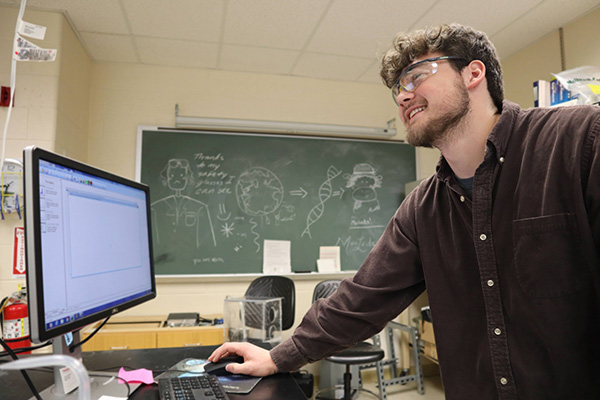

KENNESAW, Ga. | Apr 2, 2024
Mason Hipp, a sophomore chemistry major at Kennesaw State University, won first place at the 101st annual meeting of the Georgia Academy of Science in March.

Hipp described phosphorus-containing molecules as potential biomarkers in the field of astrobiology, or the study of the potential for life to exist and survive in extraterrestrial environments.
“Our hypothesis is that schreibersite, Fe2NiP, is the ultimate source of phosphorus in extraterrestrial environments,” Hipp said. “Specifically, we believe that the surface corrosion of schreibersite may be important in the formation of small phosphorus-containing molecules. Subsequently, such molecules aid in identification of prebiotic exoplanets by serving as observable biomarkers to telescopes like the James Webb Space Telescope.”
The James Webb Space Telescope is a large infrared telescope that was launched by NASA in December 2021.
Hipp is a former First-Year Scholar and has presented his research previously, so he said he felt prepared. He described the conference as being more fluid and open than previous ones he has attended, and he was excited to peruse other research projects.
Hipp's mentor is Dr. Heather Abbott-Lyon, associate professor of chemistry in the Department of Chemistry and Biochemistry, as well as interim director of research development and strategic initiatives in the Office of Research.
“Since I started college in the Fall of 2022, I have worked with Dr. Abbott-Lyon. Working with her has empowered me professionally, scientifically, and personally,” Hipp said. “In the Abbott-Lyon Laboratory (ALL), I am learning many elements of professionalism, valuable and transferrable scientific skills, and confidence in myself as a scientist. She is as kind as she is intelligent and enjoys developing the students who work in her lab.”
Abbott-Lyon expressed pride in her student’s win, saying: "I'm really proud of Mason. Not only has he learned how to perform the experiments, but he also understands our motivation for doing these measurements, how to interpret our results, and the potential impact of this work. I am especially proud of him, because he chose to come back to the project after navigating significant personal challenges last spring,” she said. “Mason is an intelligent, curious, and driven individual, and I look forward watching his career path.”